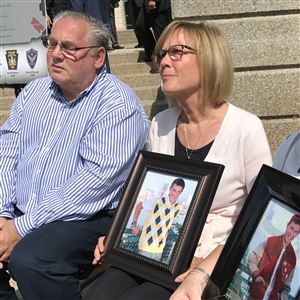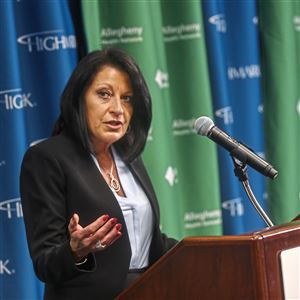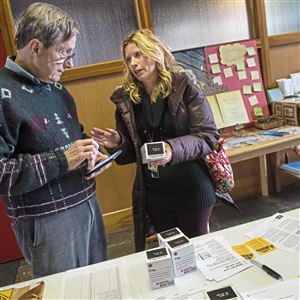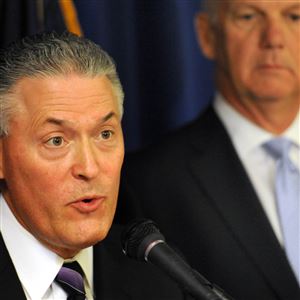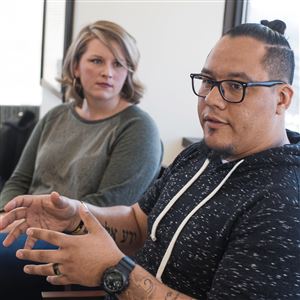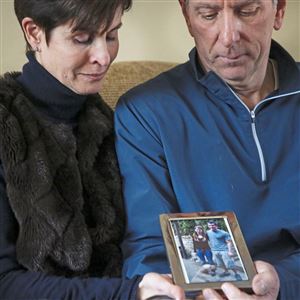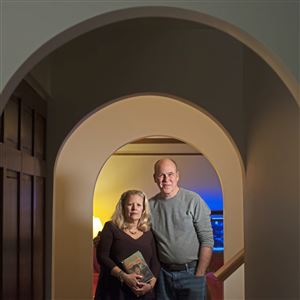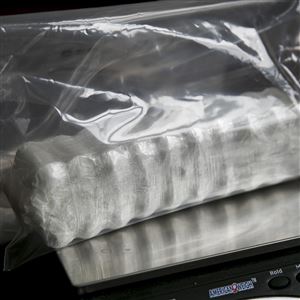Ziplining, horse grooming and riding, hiking, yoga, time around the fire pit — you’d think the place just off the Turnpike in Donegal was a high-end summer camp. Instead, it’s a new and novel drug rehab facility that aims to fill what its founders see as a gap in the region’s offerings, providing a radically holistic course of treatment — for people with private insurance.
DreamLife Recovery held its ribbon cutting Thursday, nearly three months after it took in its first patient, but with around three-quarters of its 85 beds as yet empty.
Building on the staff’s experiences in the recovery magnet of Florida, the for-profit start-up is hoping that a resort-like approach will draw professionals and other privately insured people. The target client is someone who might not otherwise find the right atmosphere in a region where most rehabs cater to people on Medicaid.
“If you have Medicare or Medicaid, you don’t have a problem finding a place” near Pittsburgh, said Peter Ventre, DreamLife’s chief medical officer, who treated plenty of Pennsylvanians during a dozen years working in Fort Lauderdale, Fla. “But if you have private insurance, you will try and try and try, and you will end up going out of state, or far east.”
Traveling for rehab is OK, he said, but it usually precludes both the involvement of family and supervised integration back into the community — two of DreamLife’s hallmarks.
Executive director Gina Marchando, a Peters native who pursued her career in family therapy in Florida and then Tennessee, said the region’s needs really came home to her in 2017, when a family member died from an opioid overdose. She came back here for the funeral.
Mourning with family, she saw the opioid epidemic “heavily reported on that week. … I just couldn’t wrap my head around it, with Pittsburgh being such a medicalized city.”
Dr. Ventre, meanwhile, sought to open a facility in a place of great demand, and market research led him here.
“We found out that in Western Pennsylvania, the need, it was brutal, unfortunately, and addiction was getting out of control, and the resources there were not enough,” he said. He found investors and team members, including Ms. Marchando, then working in a facility in Nashville.
They brought a philosophy that includes medication-assisted treatment and group therapy, but is “much more than sitting around talking about problems,” said Ms. Marchando.
What would you say to light therapy, sound therapy, medical grade infrared sauna, a hydromassage chair, chiropractic and acupuncture options, trips to Seven Springs’ ziplines, horse grooming and riding at a barn in Ligonier?
Dr. Ventre said they’re not trying to make rehab fun, exactly, but rather trying to reconnect clients with their senses and with different options for socializing and feeling.
Prior to arriving at DreamLife, he said, a client’s concept of socializing may consist entirely of “Let’s go out and have a drink with friends,” he said. “But unfortunately our patients don’t have the ability to stop. They keep going.
“We teach the patient, listen, you can go rafting, you can go ziplining, you can play basketball like we have in our backyard here,” he said. (There’s a volleyball net, too.) “We want to create a way that the patient can experience as much as possible, as an individual and as a group — that they really enjoy that.”
A typical stay is 30 to 90 days, though detox courses of as few as five days are available.
Asked about cost, DreamLife did not provide a per-day rate charged to insurers, but indicated that most clients "are required to pay a deductible, out of pocket or any co-insurance." Anyone without insurance -- rare in Pennsylvania -- can get a "self-pay rate which is calculated at a daily rate of the cost of housing, meals, medication, lodging and clinical engagement," a company spokeswoman wrote in response to questions.
Whatever they ultimately pay, clients are housed two to a hotel-like room.
“All that does is eliminate the materialistic concerns, the gripes,” said Dave Bontempo, DreamLife’s chief marketing officer, who went through seven years of opioid addiction before deciding, on Aug. 21, 2011, to break his cycle of overdoses, car accidents, detoxification, rehab and relapse.
Since 2012, he has worked his way up through positions at rehabilitation organizations — some better than others. He said he’s comfortable with DreamLife’s staffing, philosophy, and medical professional leadership.
“I know that I can hand vulnerable patients over to them,” he said, “and they’ll take care of them.”
Rich Lord: rlord@post-gazette.com or 412-263-1542
First Published: May 17, 2019, 4:47 p.m.
Updated: May 17, 2019, 5:02 p.m.









